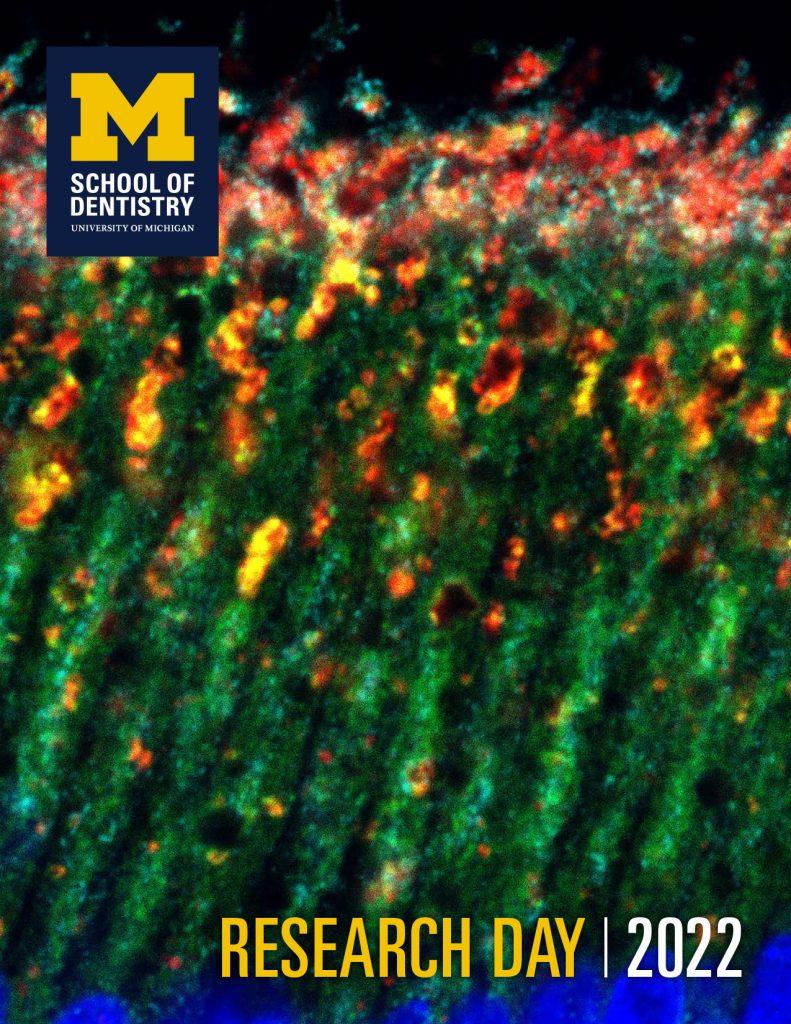School’s annual celebration of Research Day returns in-person with 94 projects on wide variety of topics15 min read
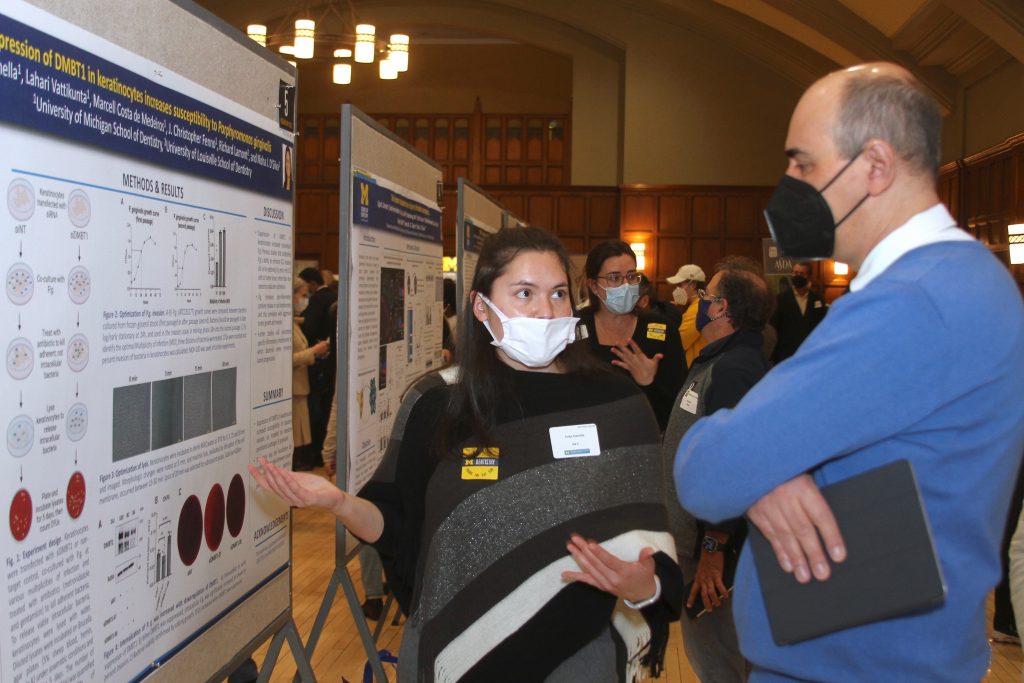
Ann Arbor, Mich., Feb. 21, 2022 – The never-ending quest for answers to a wide variety of scientific questions about oral health was demonstrated on a large scale Thursday at the School of Dentistry’s annual Research Day.
This year’s event featured 94 posters summarizing studies by dental and dental hygiene students, graduate students in various specialties, PhD candidates, postdocs, faculty, staff and visiting scholars. In between morning and afternoon poster sessions at the Michigan League, the day’s keynote address was delivered at the dental school by Dr. Jennifer Webster-Cyriaque, deputy director of the National Institute of Dental and Craniofacial Research (NIDCR) at the National Institutes of Health (NIH) in Bethesda, Md.
The annual celebration of research generates studies from four areas: Cancer Biology & Therapeutics; Clinical, Population & Educational Research; Craniofacial, Skeletal Biology & Disease; and Tissue Engineering & Regenerative Medicine. Topics were diverse: radiation resistance in oral cancer, techniques for cleft palate repair in infants, the role of healthcare providers in treating sleep apnea, and complex biomedical science with titles like “A Fgfr3-Runx2 regulatory axis controls postnatal cranial base synchondrosis formation and ossification.”
Faculty judges visited each researcher during the poster sessions and rated the quality of research, poster presentation and researchers’ oral summary of their work. Top winners are highlighted below; complete results are posted on the Research Day website here.
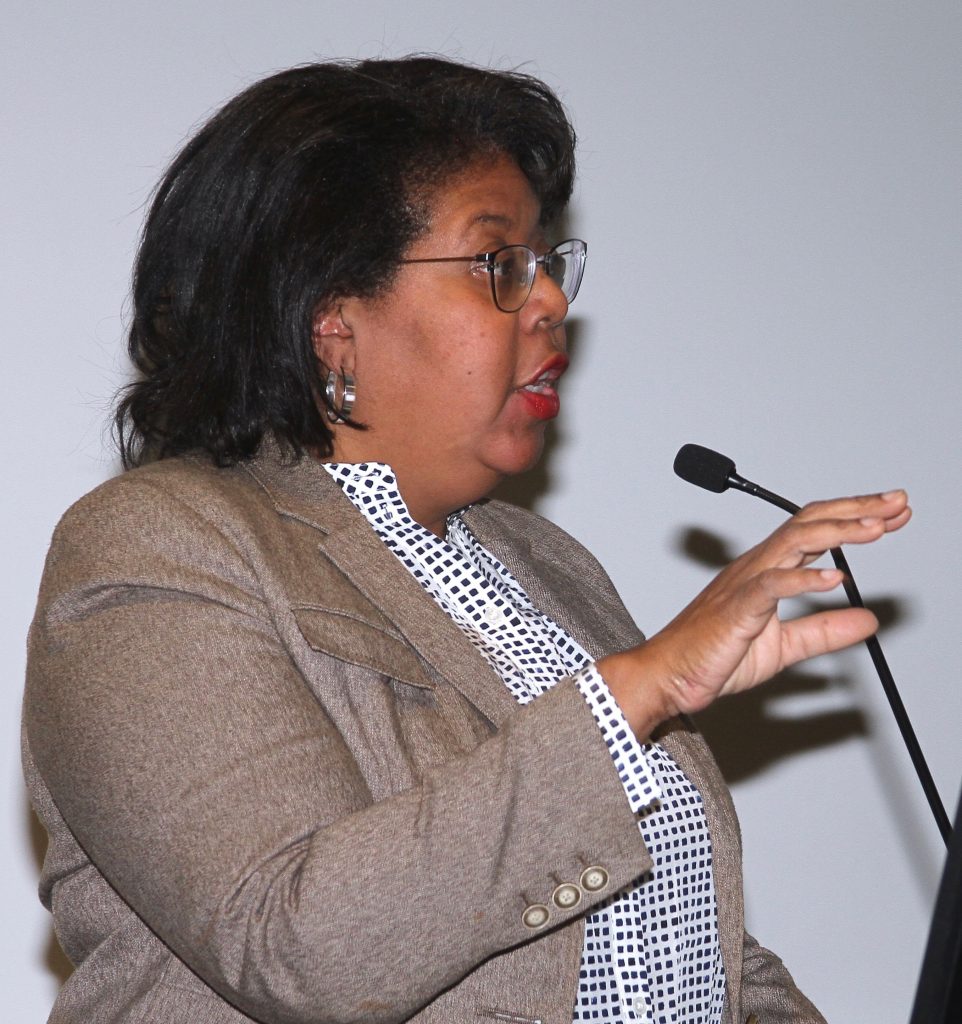
In her keynote address, Dr. Webster-Cyriaque addressed “Oral Health for All: Opportunities for Improvement and Understanding.” An accomplished clinician, researcher and leader, she joined NIDCR in December after 21 years as a faculty member at the University of North Carolina’s schools of dentistry and medicine.
Her opening remarks highlighted a landmark national report, “Oral Health in America: Advances and Challenges” that was recently completed under the direction of the NIDCR, with collaboration from NIH, the U.S. Surgeon General and the U.S. Department of Health and Human Services. The report is an update of a groundbreaking Surgeon General study in 2000 that emphasized how oral health is directly related to overall health and well-being, while identifying significant gaps in access to oral healthcare for many Americans.
While the new report shows improvements in national oral health and healthcare in the 20 years since the first report, Webster-Cyriaque emphasized that the report found that oral health still varies significantly among Americans based on age, economic status, and other social determinants. Basically, she said, good oral health is not equitably available across the country.
She noted that NIH and NIDCR are aggressively and strategically planning programs that will target the deficiencies cited in the report, by providing more grants, residencies and fellowships, among other initiatives. Of particular importance, she said, is the finding that diversity, equity and inclusion must be improved at many levels, whether in dental education, clinical care, or research into why oral health problems vary by race. Research must be more robust, while oral healthcare delivery and the workforce that delivers it must be reconfigured. Dental education must be more affordable and produce providers that mirror the country’s racial and other demographics. Clinical and lab research must work in tandem to improve early detection and treatment strategies for oral disease.
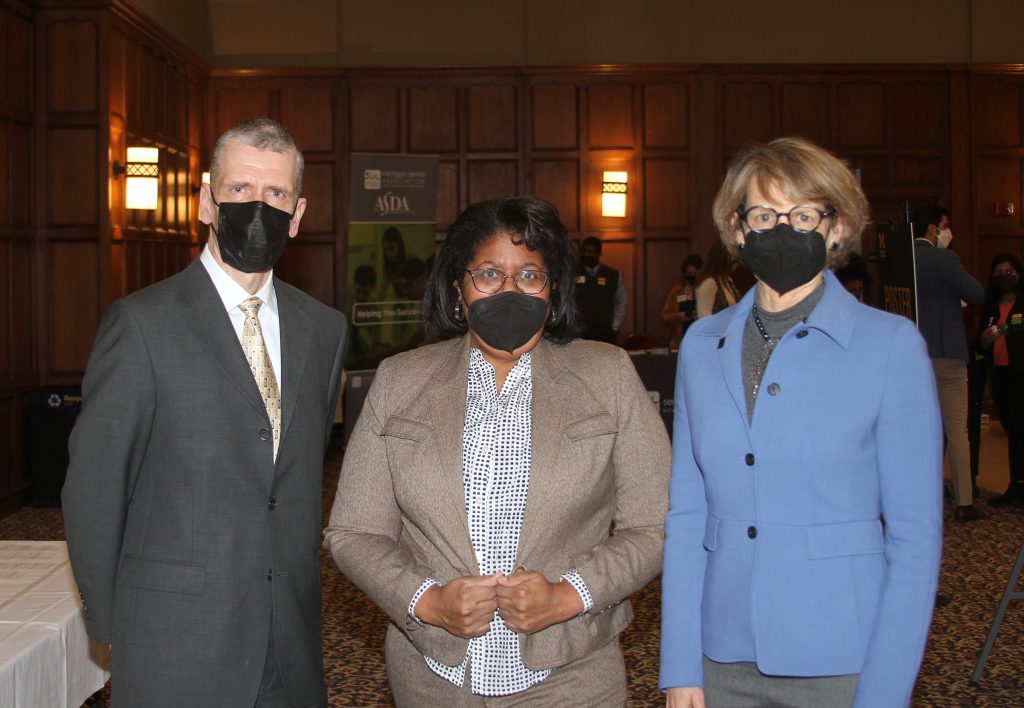
“Bottom line: A difference needs to be made to oral health in America,” Webster-Cyriaque said. “It’s going to take all of us to do it. It’s going to take the people who are doing foundational laboratory research, the people who are translating that research (for clinical care), the people who are doing clinical research, the people who are doing public health research. It’s really going to take the spectrum to move the needle.”
In keeping with the Research Day theme of the importance of scientific research, she provided examples of her career journey and its contribution to oral health for vulnerable populations. One of her specialties has been research into cancer-causing viruses that inhabit the mouth. Her research has investigated gammaherpesviruses and how HPV infections are related to oral cancer. She has participated in clinical trials for the Oral HIV AIDS Research Alliance, and has published more than 80 scientific articles and abstracts.
Webster-Cyriaque said she has always been interested in what causes diseases and the rewards of taking clinical observations into the laboratory to research what might be called “the ‘why’ of it.” Ending on an inspirational note for the Research Day audience, she added, “For me, one of the huge wins is being able to work with a team of people who want to know the answer – people who bring distinct strengths and differences to come together and answer a question. I love that about science. I love being part of that team sport.”
Whatever the research findings among the countless studies examining the craniofacial space, one thing is absolutely clear, Webster-Cyriaque said: Oral health makes a significant difference in preventing oral disease and in maintaining overall health.
_____________________
2022 Research Day Awards
Following are the awards for the top research projects as well as several other annual awards for support staff and others. Complete results are posted on the Research Day website here.
SCADA (Student Competition for Advancing Dental Research and its Application)
• Ben Swanson, a dual DDS/Ph.D. student, received the SCADA Award for his research, “Towards Regeneration of the Cranial Suture: Pore Curvature Regulates Mesenchymal Stem Cell Fate in Macroporous Tissue Engineering Scaffolds.” Faculty mentor: Yuji Mishina. The SCADA award is sponsored by the American Association for Dental, Oral, and Craniofacial Research (AADOCR) and Dentsply Sirona, a dental supply company. Each dental school in the United States and Puerto Rico is invited to select one student to compete in this research program. Swanson will represent the school and present his research at the annual meeting and exhibition of the AADOCR in Portland, Oregon, in March 2023. This research was co-presented by Lindsey Douglas, an undergrad student at LS&A who is working with Swanson in the Mishina Lab. The Dentsply Sirona Student Research Program was launched in 1959 as a joint venture between Dentsply International and the American Dental Association. The program has grown and evolved into a global research program, including 10 national programs worldwide across 21 countries. In 2016, Dentsply International merged with Sirona Dental Systems to become Dentsply Sirona.
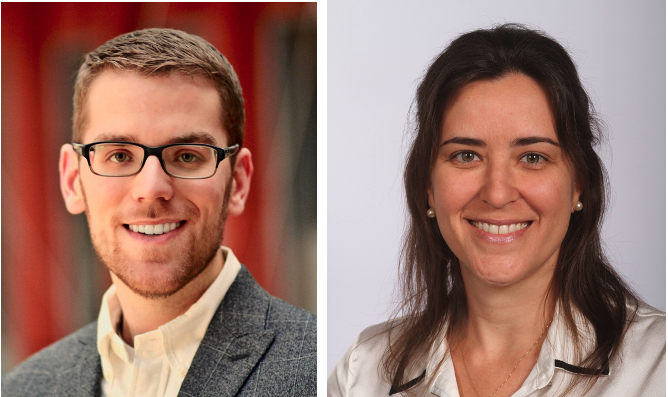
AADOCR Travel Award
• Ligia Schmitd, a Ph.D. student, received the AADOCR Travel Award to the 2022 IADR/AADOCR annual meeting and exhibition in Atlanta, Georgia, in March, where she will present her research. Research Title: “Oral Cancer-Associated Nerve Injury Stimulates Axonogenesis.” Faculty mentor: Nisha D’Silva.
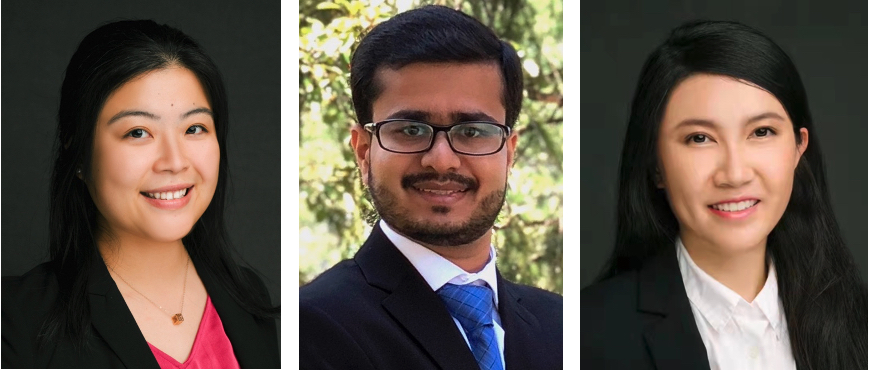
Category 1: Clinical, Public Health, Behavioral and Education Research
• 1st Place among DDS, Hygiene, Masters and Undergrad students – Linda Liu, a fourth-year DDS student. Research Title: “Improving Oral Fluoride Retention by Chewing Calcium Supplements Before a Fluoride Rinse.” Faculty mentor: Livia Tenuta.
• 1st Place among PhD Students (DDS/PhD), Postdoctoral Trainees and Staff – Dishant Patel, staff research assistant in health policy and public health. Research Title: “Funding Trends in The Ongoing Dental Clinical Trials of the USA.” Faculty mentor: Romesh Nalliah.
Category 2: Basic Science Research and Translational Science
• 1st Place among DDS, Hygiene, Masters and Undergrad students – Gefei Wang, a fourth-year DDS student. Research Title: “Insights About Oral Hygiene Habit Forming Apps.” Faculty mentor: Lynn Johnson.
• 1st Place among PhD Students (DDS/PhD) and Postdoctoral Trainees and Staff – Ligia Schmitd, a Ph.D. student. Research Title: “Oral Cancer-Associated Nerve Injury Stimulates Axonogenesis.” Faculty mentor: Nisha D’Silva.
Dental Hygiene Awards
• 1st Place Original Research Award – Meg Crowley and Katelyn Mulawa, fourth-year Dental Hygiene students. Research Title: “Oral Health Knowledge and Attitudes of Online Nurse Practitioner Student: A Pilot Study.” Advisor: Dani Rulli.

• Table Clinic Award – Justin Curis and Sonia Gazi, fourth-year Dental Hygiene students. Title: “The Inflammatory Mediators Effect on Systemic Conditions: A Review of the Literature.” Advisor: Valerie Nieto.
Other Research Day awards
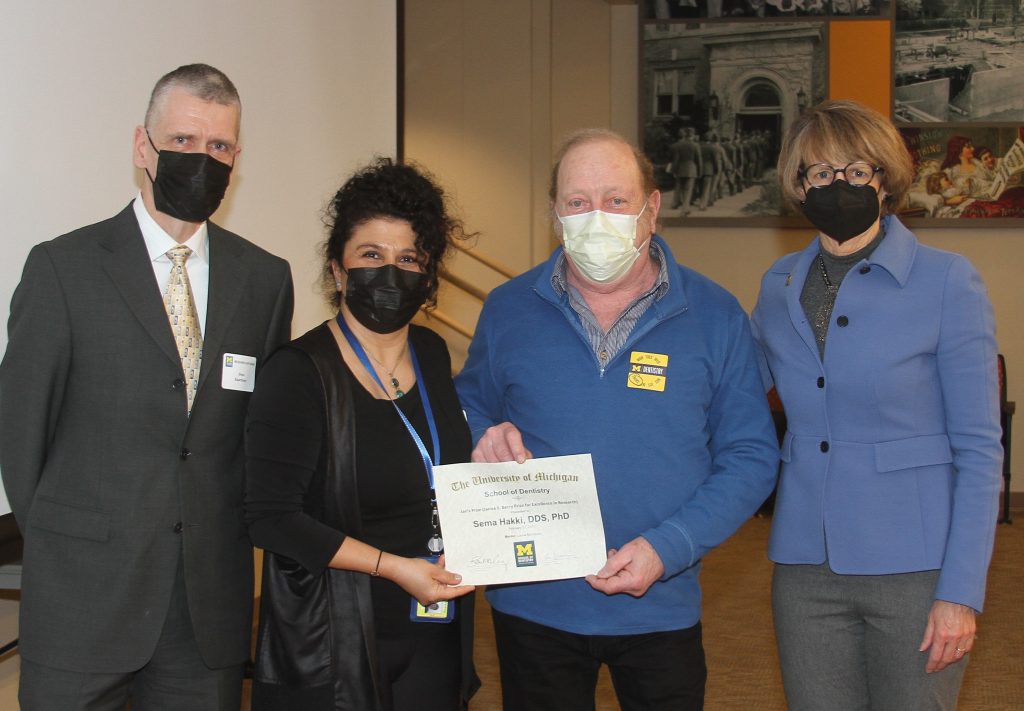
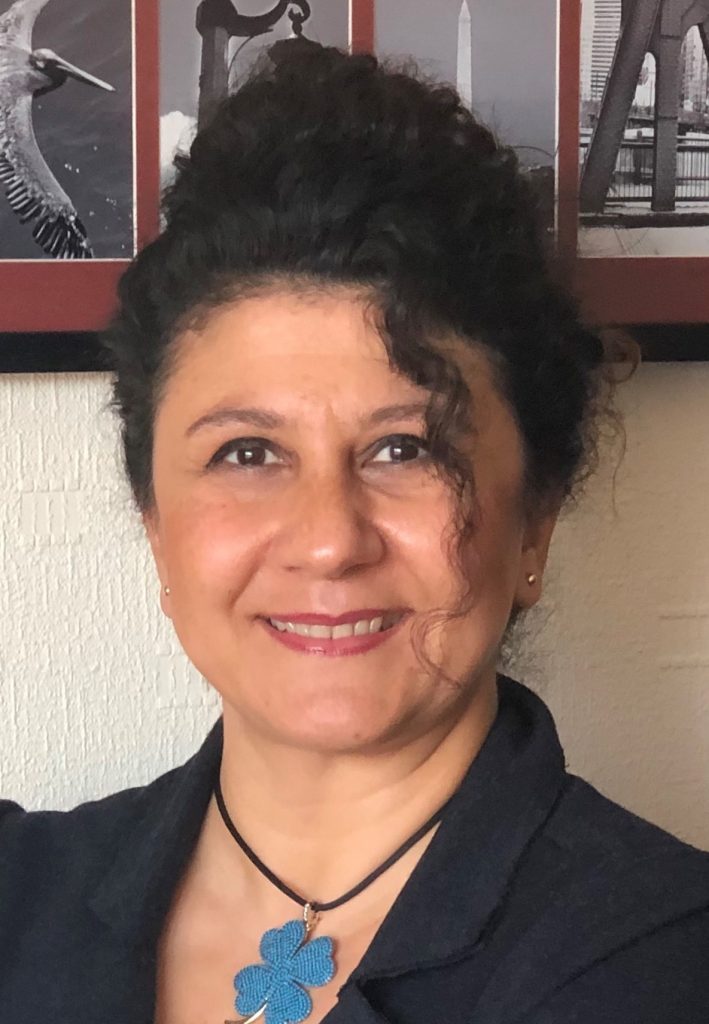
• Sema Hakki, a visiting professor from Turkey, received the Janice E. Berry Prize for Excellence in Research. The family of Berry, a longtime U-M and dental school staff member who died in 2016, created the $1,000 award, also known as Jan’s Prize, to recognize a full-time researcher who may be currently experiencing a financial hardship. Berry was well-known for her steady and compassionate encouragement and support of researchers at the school, including an understanding that research sometimes creates financial hardships. The recipient of Jan’s Prize must have demonstrated excellence in research, teaching, mentoring, service and leadership. Hakki has returned to the dental school as a visiting professor two decades after she was first at the school as a post-doctoral fellow who worked in a research lab with Jan Berry. Said a nominator: “Not only is Sema worthy of this award via the award criteria outlined, but she shares many of the attributes that Jan displayed – a love of science, a dedication to a life of service, and an appreciation for social causes..” Jan Berry’s husband John Copely helped present the award to Hakki.
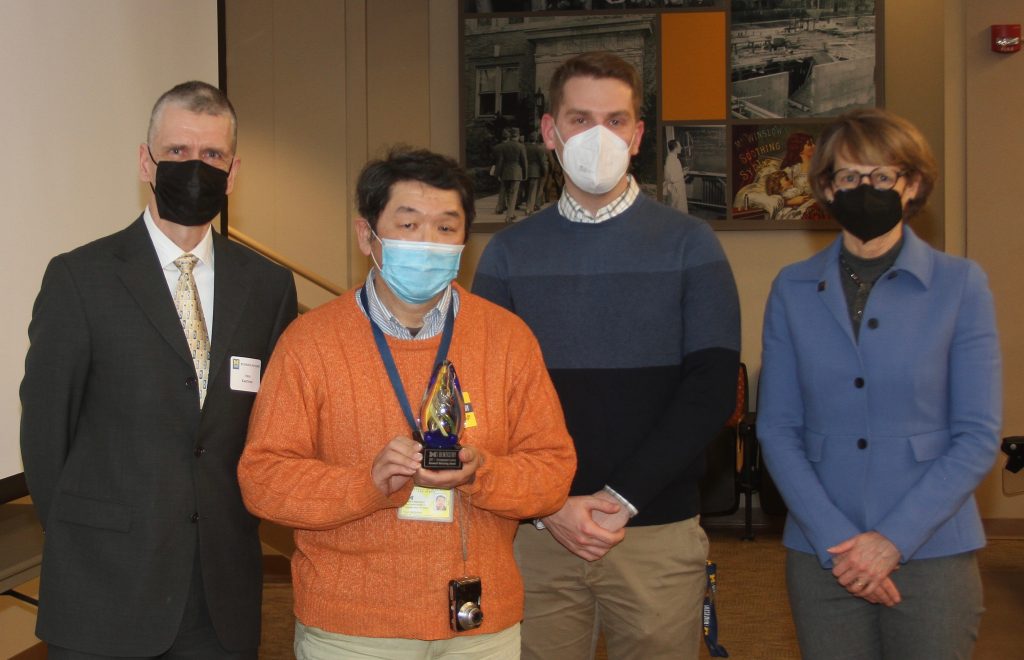
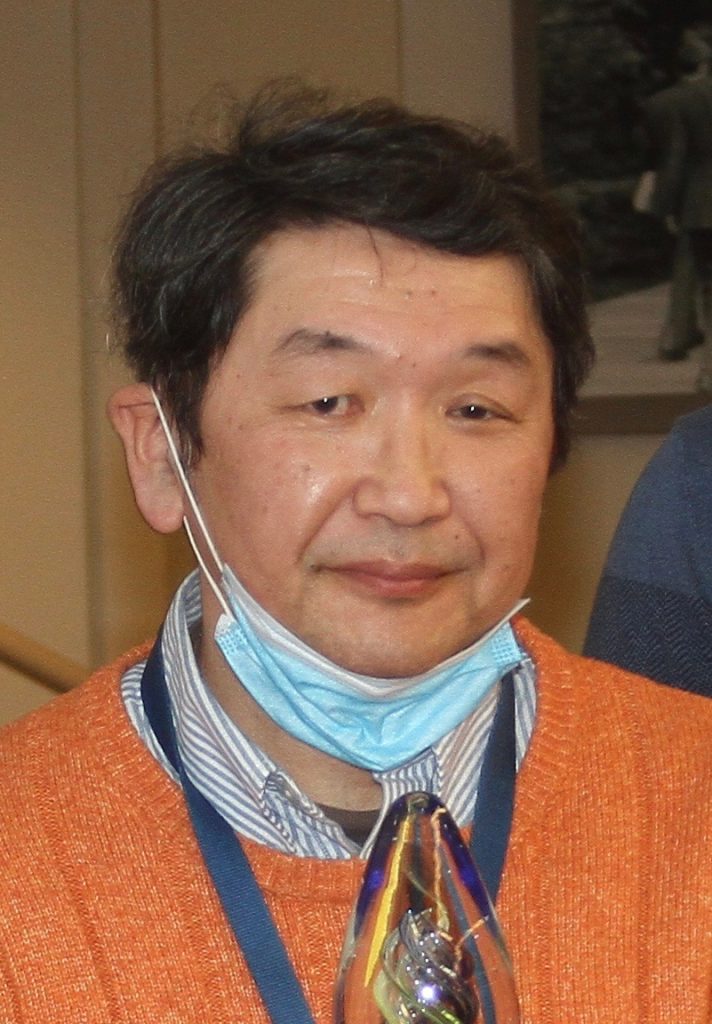
• Dr. Yuji Mishina, Professor of Dentistry in the Department of Biologic and Materials Sciences & Prosthodontics, received the Distinguished Faculty Mentoring Award. It recognizes faculty who consistently impart their research knowledge and experience with students and scholars in areas of clinical, basic science and-or translational research. “Dr. Mishina fosters an environment of collaboration, respect, and purpose in his lab,” said one nominator. “He routinely encourages members not only to ask questions but also to propose answers themselves. Instead of giving answers directly, Dr. Mishina encourages growth in his mentees by spending time engaging in discussions and steering us toward conclusions. In doing so, he fosters an excitement toward seeking answers and builds confidence in his mentees.” Added another nominator who has worked with Dr. Mishina for several years: “From the onset he was curious about my interests and helped me to set goals which held both of us accountable for my progress. He was always willing to meet with me, always listened, and I felt like he always brought an attitude of enthusiasm, curiosity, and encouragement to our conversations.”
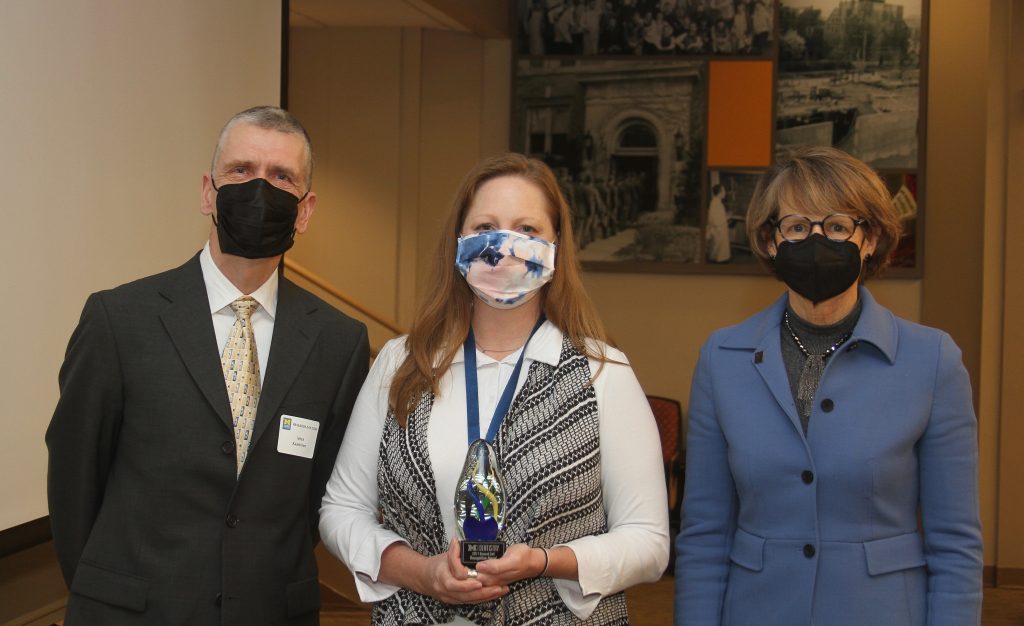
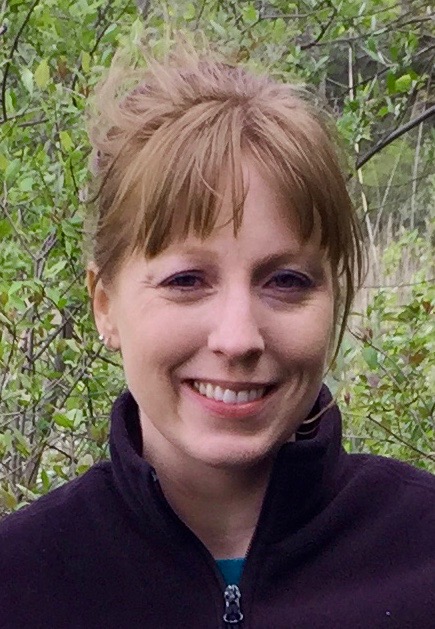
• Amy Watson, Program Coordinator of the Oral Health Sciences Master’s Program and Assistant to Dr. Vesa Kaartinen, received the Research Staff Recognition Award. Nominators said Watson is a key and indispensable staff member in dental school’s Office of Research. She has previously filled the role of Administrative Assistant Senior and became the program coordinator for the first cohort of the new OHS Master’s Program last year. “Amy is a great team player who always goes above and beyond to make our office’s initiatives and projects successful,” the nomination said.
A complete list of the 2022 Research Day Awards is posted on the Research Day webpage here. It also contains a link to the event’s electronic program with the roster of all student presenters, as well as the dentistry- and research-related companies who attend the event as exhibitors and-or provided sponsorship and advertising to support it.
Research Day is organized by the school’s Office of Research, under the direction of Dr. Vesa Kaartinen, the Dr. Roy H. Roberts Professor of Dentistry and Associate Dean for Research, and by the school’s chapter of the American Student Dental Association (ASDA).
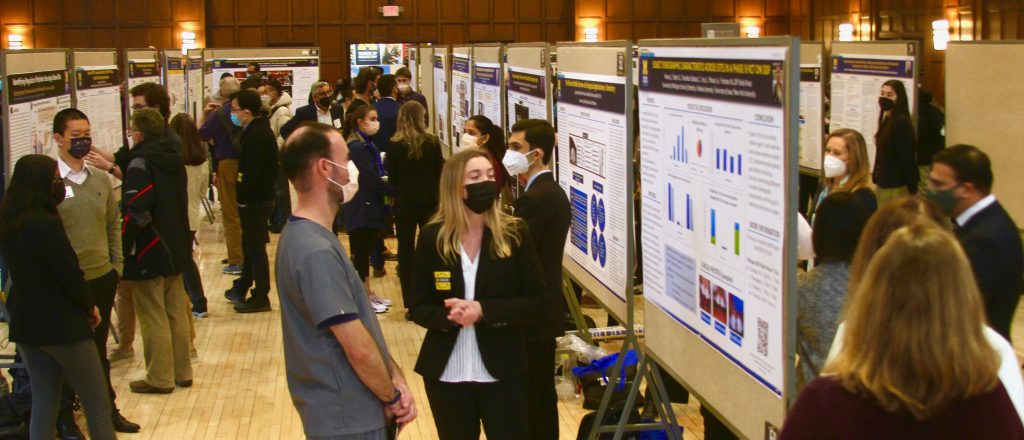
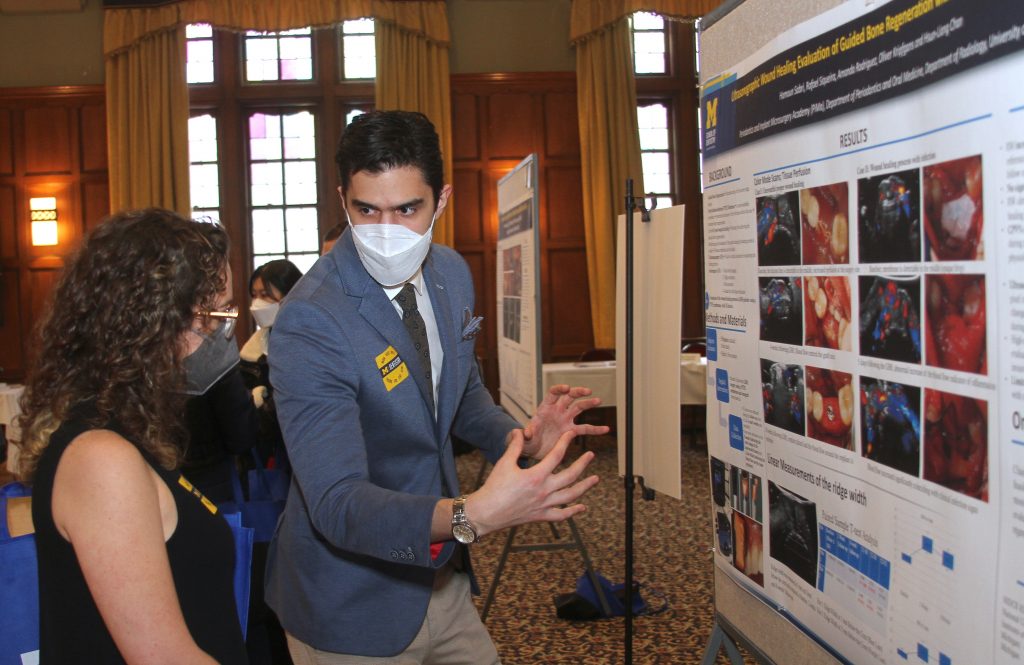
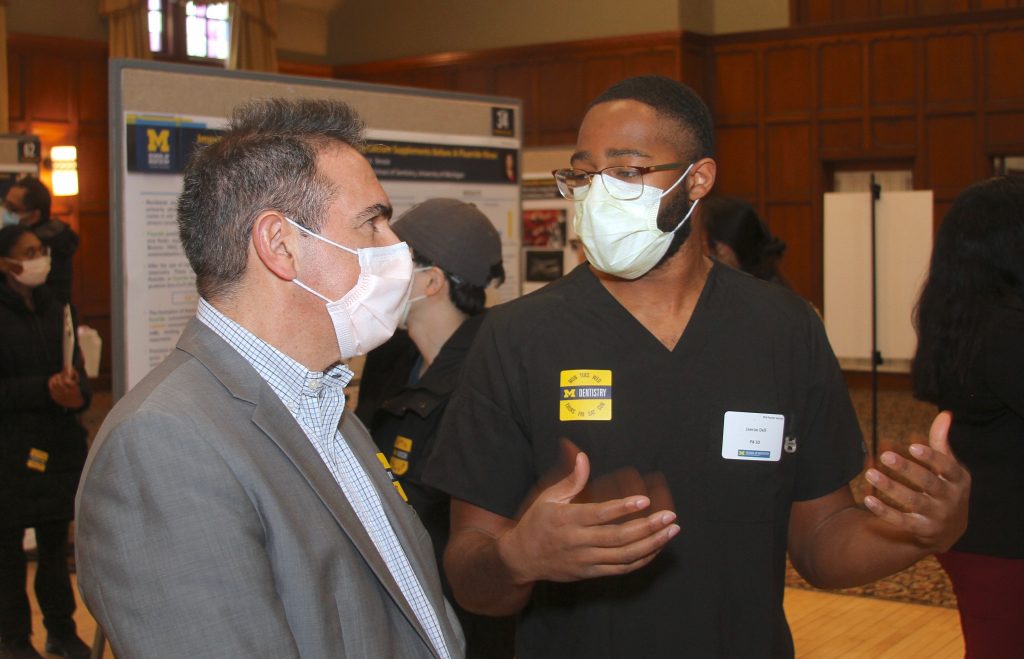
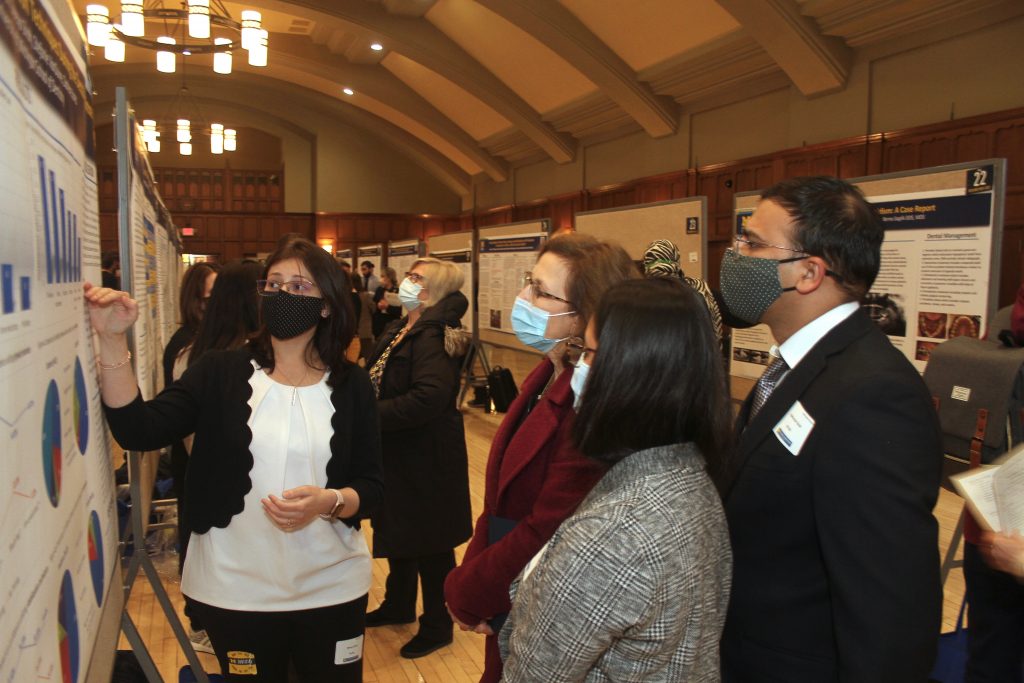
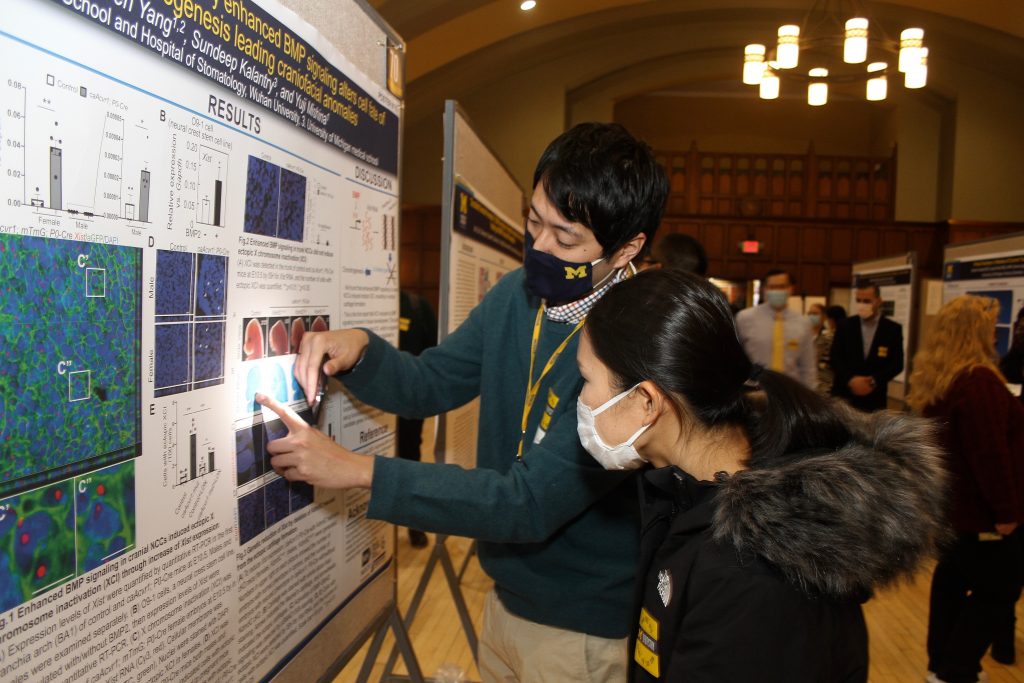
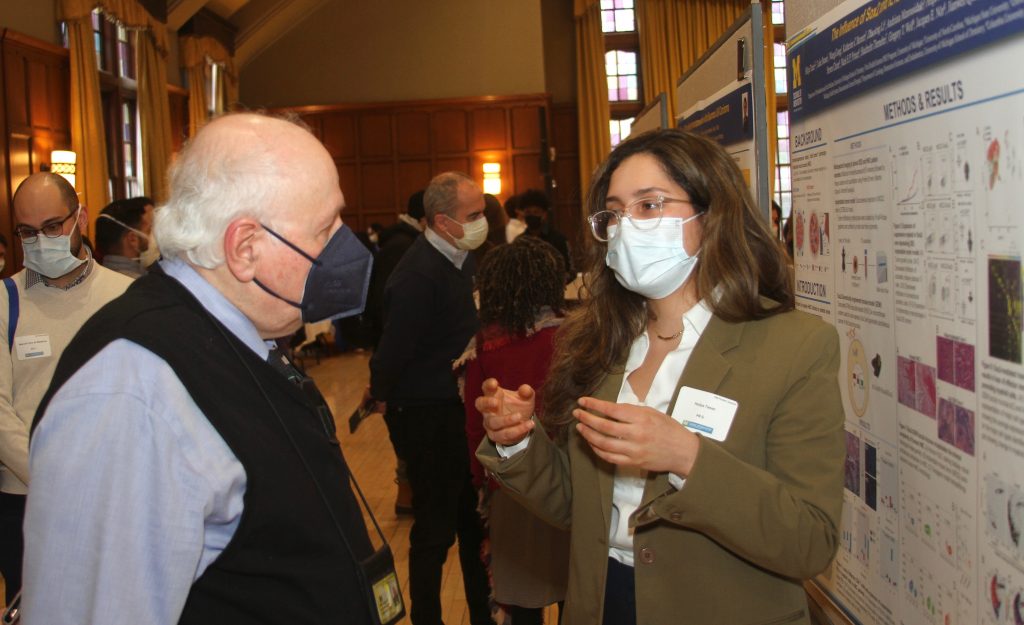
###
The University of Michigan School of Dentistry is one of the nation’s leading dental schools engaged in oral health care education, research, patient care and community service. General dental care clinics and specialty clinics providing advanced treatment enable the school to offer dental services and programs to patients throughout Michigan. Classroom and clinic instruction prepare future dentists, dental specialists and dental hygienists for practice in private offices, hospitals, academia and public agencies. Research seeks to discover and apply new knowledge that can help patients worldwide. For more information about the School of Dentistry, visit us on the Web at: www.dent.umich.edu. Contact: Lynn Monson, associate director of communications, at [email protected], or (734) 615-1971.

